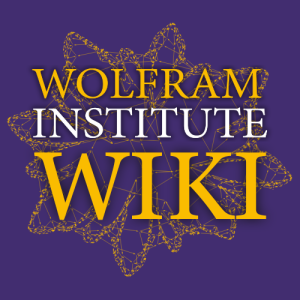Welcome: Difference between revisions
| Line 10: | Line 10: | ||
== Latest Research == | == Latest Research == | ||
<rss max=" | <rss max="5">https://wolframinstitute.org/output?format=rss</rss> | ||
== 🧭 Getting Started == | == 🧭 Getting Started == | ||
Revision as of 19:08, 30 July 2025

Welcome to the Wolfram Institute Wiki
The Wolfram Institute for Computational Foundations of Science is dedicated to the study of the simple computational rules that underlie the complexity of scientific phenomena—and to understanding how the universe, and science itself, emerges from them.
This is the official wiki of the Institute, where you’ll find documentation, research notes, technical references, and collaborative work on our computational frameworks and initiatives.
Latest Research
- Quantum Operators From Wolfram Model Multiway Systems
- Furkan Semih Dündar, 2026-01-21 19:17:48
- What Is Ruliology?
- Stephen Wolfram, 2026-01-13 03:30:32
- Quantum Gates from Wolfram Model Multiway Rewriting Systems
- Furkan Semih Dündar, 2025-12-27 17:33:24
- What’s Special about Life? Bulk Orchestration and the Rulial Ensemble in Biology and Beyond
- Stephen Wolfram, 2025-11-11 18:21:00
- Quantum Gravity and Computation: Information, Pregeometry, and Digital Physics
- Xerxes D. Arsiwalla, 2025-11-10 17:55:03
🧭 Getting Started
Welcome to the Wolfram Institute Wiki! If you're new to editing wikis, here are some helpful resources to get you started:
A comprehensive guide on how to edit pages using both the source editor and the VisualEditor.
Learn how to use the VisualEditor to make edits without needing to write wikitext.
A step-by-step tutorial for creating and editing pages, adding links, images, and formatting.
A short video covering the basics of editing, creating, and discussing pages.
These resources should help you become comfortable with contributing to the wiki. Feel free to explore and experiment — your contributions are welcome!
Main Areas of Research
We pursue a range of fields that explore the computational universe and its implications for fundamental science. This multidisciplinary approach fosters innovation and drives new understanding of the underlying structures of reality.
This wiki is a living document — continually evolving as our research progresses. Feel free to explore, contribute, and collaborate!